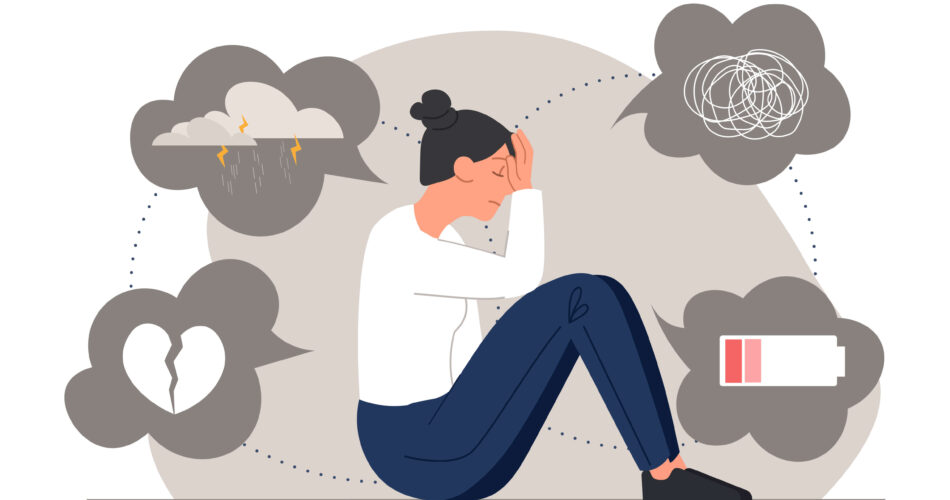Mental illness is a topic that is often clouded by misconceptions and misunderstandings. To break down these barriers and promote understanding, it is important to differentiate between myths and facts surrounding mental illness. Debunk common misconceptions by understanding this accurate information in our blog.
Understanding Mental Illness

The term mental illness refers to a wide range of conditions that affect a person’s thinking, emotions, behavior, or mood. These conditions can significantly impact a person’s daily functioning, relationships, and overall well-being. It is important to note that such illnesses are not the result of personal weakness or character flaws, but rather are influenced by various factors.
When it comes to understanding mental illness, it is crucial to recognize that it is a multifaceted and nuanced topic. It can manifest in various ways, and their severity can vary from person to person. Some individuals may experience serious mental illnesses, which involve alarming symptoms, while others experience mild symptoms that are manageable with proper support and treatment.
Furthermore, mental illnesses can affect people of all ages, from children to older adults. They do not discriminate based on gender, race, ethnicity, or socioeconomic status. Anyone can be susceptible to mental health issues. That’s why it is essential to foster a society that promotes understanding, empathy, and support for those who are affected.
The Prevalence of Mental Illness
According to the World Health Organization, approximately one in four people worldwide will experience a mental health issue at some point in their lives. These conditions can affect individuals of all ages, genders, and cultural backgrounds, and have no regard for social or economic status.
Moreover, it is important to note that mental health issues can vary in their duration and intensity. Some individuals may experience short-term episodes of mental illness, while others may face chronic conditions that require long-term management.
Understanding its prevalence is crucial in combating the stigma that often surrounds it. By recognizing that mental health issues are widespread, we can work towards creating a more inclusive and supportive society. It is essential to promote awareness and education about mental health, ensuring that individuals have access to the resources and support they need.
Common Types of Mental Illness
There is a diverse range of mental health problems, each with its unique symptoms and impacts. It is essential to understand that mental illnesses are not monolithic, and each individual may uniquely experience their condition.
Here are the most common types of mental illness:
- Depression: An emotional disorder characterized by persistent feelings of sadness, hopelessness, and a loss of interest in activities once enjoyed. It can be simplified as a depressed mood, where individuals feel the lack of will to do things.
- Anxiety Disorders: A mental health disorder that involves significant distress or excessive worry, fear, and apprehension that can interfere with daily life.
- Bipolar Disorder: Marked by extreme mood swings, ranging from manic episodes of heightened energy to depressive episodes of low mood and energy.
- Schizophrenia: A complex and chronic mental illness characterized by hallucinations, delusions, disorganized thinking, and a lack of emotional expression
- Anorexia Nervosa and Bulimia Nervosa: Eating disorders that involve distorted body image and unhealthy relationships with food, leading to severe physical and psychological consequences.
- Dissociative Identity Disorder: This mental illness is a complex condition where a person experiences two or more distinct identities that control their behavior and consciousness at different times. Formerly known as multiple personality disorder, DID often stems from severe trauma or abuse during childhood.
- Attention Deficit Hyperactivity Disorder: ADHD, is a mental disorder characterized by difficulty in paying attention, hyperactivity, and impulsivity. It can impact children and adults, affecting their performance at school or work and their relationships. Proper diagnosis and management are essential in helping individuals with ADHD lead fulfilling lives.
It is important to emphasize that these are just a few examples of the many types of mental illnesses that exist. Each condition has its own set of symptoms, diagnostic criteria, and treatment approaches. Understanding the diversity within mental health is crucial in providing appropriate support and resources to individuals who are affected.
Myths Surrounding Mental Illness

Myths Surrounding Mental Illness
There are several perceptions when it comes to the mental conditions that a person may have. These myths can perpetuate stigma and discrimination, making it more difficult for individuals with mental health conditions to seek help and support. Let’s uncover the most common myths surrounding mental illness and shed light on the realities.
Myth: Mental Illness is a Sign of Weakness
One of the most damaging myths is the mistaken belief that it is a sign of personal weakness or a lack of willpower. In reality, these illnesses are complex medical conditions that involve various biological, psychological, and social factors. They are not something that individuals can simply “snap out of” or overcome through sheer determination.
It is important to understand that mental illness does not discriminate. It can affect anyone, regardless of age, gender, socioeconomic status, or background. Just like any other medical condition, it requires proper diagnosis, treatment, and support.
Furthermore, it is crucial to recognize that seeking help for mental health issues is a sign of strength, not weakness. It takes courage to acknowledge one’s struggles and reach out for assistance. By seeking professional help, individuals can gain access to the necessary resources and support systems to manage their mental health effectively.
Myth: People with Mental Illness are Dangerous
Another prevailing myth is the notion that people with mental illness are inherently dangerous or violent. This misconception perpetuates stigmatization and discrimination against individuals living with mental health conditions. The truth is that the vast majority of individuals with such illnesses are more likely to be victims of violence than perpetrators.
It is important to understand that it does not equate to violence. The majority of people with mental health conditions are nonviolent and pose no threat to others. Individuals with mental illness are more likely to experience social isolation, discrimination, and difficulties accessing appropriate healthcare.
By perpetuating the myth, we contribute to the marginalization of individuals who are already struggling with their mental health. It is essential to challenge these stereotypes and promote a more compassionate and understanding society.
Myth: Mental Illness is Rare
Contrary to popular belief, it is not a rare occurrence. It affects millions of people worldwide and can have a profound impact on their lives. Unfortunately, due to the stigma and misconceptions associated with mental health, many individuals may hesitate to seek help or disclose their struggles, leading to underreporting and a perceived lower prevalence.
Mental illness encompasses a wide range of conditions, including depression, anxiety disorders, bipolar disorder, schizophrenia, and more. These conditions can vary in severity and duration, but they all have one thing in common: they can significantly impact a person’s thoughts, feelings, and behaviors.
It is vital to recognize that mental illness is not a personal failure or a character flaw. It is a legitimate health condition that requires understanding, empathy, and appropriate treatment. By raising awareness and challenging the myths surrounding mental illness, we can create a society that supports and empowers individuals to seek help and live fulfilling lives.
Facts About Mental Illness

It is crucial to understand that mental illness is not a personal failure but a legitimate medical condition that requires appropriate diagnosis, treatment, and support. Just like other physical illnesses, mental health conditions can have a profound impact on an individual’s well-being and quality of life. Learn more about this condition with the list of facts below!
Fact: Mental Illness is a Medical Condition
Mental conditions are rooted in various risk factors like biological, psychological, and environmental aspects that can disrupt brain chemistry, cognitive function, and emotional well-being.
These illnesses can manifest in different ways, each with unique symptoms, diagnostic criteria, and treatment approaches. It is essential to seek professional help to receive an accurate diagnosis and develop an individualized treatment plan.
Fact: Mental Illness Affects People of All Ages
It does not discriminate by age and can affect individuals across the lifespan. From children to older adults, no one is immune to the potential impact of mental health challenges. Recognizing and addressing mental health concerns in young people is particularly crucial, as early intervention can lead to better outcomes.
In children and adolescents, mental health conditions can often present as behavioral problems, academic difficulties, or social withdrawal. Parents, educators, and healthcare providers need to be vigilant in identifying signs of mental distress and providing appropriate support and intervention.
Similarly, mental health issues can emerge or persist in adulthood and later stages of life. Factors such as stress, trauma, life transitions, and biological changes can contribute to the development or exacerbation of mental illnesses. It is never too late to seek help and find effective strategies for managing mental health concerns.
Fact: Treatment Options for Mental Illness is Available
Contrary to popular belief, treatment and support options for mental illness are widely available. These can include psychotherapy, medications, support groups, and various other interventions. Seeking help from a mental health professional can be instrumental in managing symptoms, enhancing well-being, and promoting recovery.
Psychotherapy or talk therapy, can help individuals explore their thoughts, emotions, and behaviors in a safe and supportive environment. It can provide valuable insights, coping strategies, and tools for managing mental health challenges. Additionally, medications, when prescribed and monitored by a qualified healthcare provider, can help regulate brain chemistry and alleviate symptoms.
Support groups and peer support networks can also play a significant role in the recovery process. Connecting with others who have similar experiences can provide a sense of belonging, validation, and encouragement. These groups can offer a platform for sharing coping strategies, learning from one another, and fostering a sense of community.
It is important to remember that treatment for mental illness is not a one-size-fits-all approach. Each individual’s journey to recovery is unique, and it may involve a combination of therapies, medications, lifestyle changes, and ongoing support. With the right resources and support system in place, individuals with mental illness can lead fulfilling and meaningful lives.
The Impact of Stigma on Mental Illness

The stigma surrounding mental illness can have severe consequences for individuals living with these conditions. It can lead to feelings of shame, isolation, and self-doubt, preventing individuals from seeking help or disclosing their struggles. Stigmatization can also result in limited access to healthcare, employment discrimination, and social exclusion, exacerbating the burden of mental illness.
One of the most significant consequences of stigma is the negative impact it has on an individual’s mental health. When someone is stigmatized because of their mental illness, they may internalize these negative beliefs and develop a sense of shame and self-blame. This can lead to a vicious cycle of self-doubt and low self-esteem, making it even harder for individuals to reach out for support.
Furthermore, the stigma surrounding mental illness can also have a detrimental effect on an individual’s social relationships. Friends, family members, and even romantic partners may distance themselves from someone with a mental illness due to fear, misunderstanding, or prejudice. This social isolation can intensify feelings of loneliness and exacerbate symptoms of depression and anxiety.
Conclusion
Debunking myths and promoting awareness about mental illness is crucial for fostering a more compassionate and supportive society. By understanding the realities of mental health challenges and challenging the stigma surrounding these conditions, we can create a safer environment. Thus, encourages individuals to seek help, fosters empathy, and promotes overall well-being for all.
If you are suffering from any of the mental conditions mentioned earlier, feel free to consult with an expert. Book an online consultation with our list of specialty doctors!



